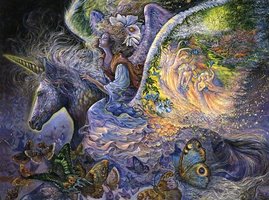
Aphrodite, or "foam-born" was what the Greeks called Venus. Greek legend tells that Kronos (Saturn) castrated his father Ouranos (Uranus) while Uranus lay in bed with his wife and Saturn’s mother, Gaia. When Saturn threw his father’s testicles into the sea near Cyprus, Venus emerged from the foam (hence "foam-born") and was taken to the island. Hesiod, the Greek poet who lived just after Homer (c. 700BC) best known for Theogony and Works and Days, tells it as follows:
"And so soon as he had cut off the members with flint and cast them from the land into the surging sea, they were swept away over the main a long time: and a white foam spread around them from the immortal flesh, and in it there grew a maiden. First she drew near holy Cythera, and from there, afterwards, she came to sea-girt Cyprus, and came forth an awful and lovely goddess, and grass grew up about her beneath her shapely feet. Her gods and men call Aphrodite, and the foam-born goddess and rich-crowned Cytherea, because she grew amid the foam, and Cytherea because she reached Cythera, and Cyprogenes ("Cyprus-born") because she was born in billowy Cyprus, and Philommedes (Genitals-lover) because she sprang from the members. And with her went Eros, and comely Desire followed her at her birth at the first and as she went into the assembly of the gods. This honor she has from the beginning, and this is the portion allotted to her amongst men and undying gods,- the whisperings of maidens and smiles and deceits with sweet delight and love and graciousness."
This ancient goddess, however, predates even her Cypriot and Greek forms. In Sumeria she was known as Inanna, in Babylon and Assyrian Ishtar, the Egyptians called her Hathor, Quaddesha and Aset, to the Phonecians she was Astarte, to the Hebrews Ashtoreth and Ashera, and to the Philistines Atergatis. And Homer’s tale that Zeus and his female form Dione were her parents creates an interesting paradox. Her foam-born birth occurred when Zeus’ father Saturn castrated Zeus’ grandfather Uranus. At that point, however, Saturn had yet to father his Olympian children, including Zeus himself.
Aphrodite's husband was the lame blacksmith god Hephaistos (Roman Vulcan), but her lover was Ares (Mars). Her children by Mars were Harmonia, Deimos (Fear) and Phobos (Panic). The latter two were usually involved in strife and battle; the planet Mars' two moons were named after them. She was also the mother of Hermaphroditus with Mercury (Hermes), Priapus with Dionysus (Bacchus), and Beroe (after whom the city Berytus in Lebanon was named) with Adonis. Adonis was so beautiful that while still a boy Aphrodite concealed him in a chest with the queen of the underworld, Persephone, who in turn became so enamored of Adonis that she wouldn't give him back. Zeus settled their dispute by dividing Adonis' year into three parts: one part he would have by himself, one part would be with Persephone, and the remainder would be with Aphrodite. But Adonis chose to spend his own part of the year with Aphrodite.
Aphrodite was also the mother of Eryx and Rhodes by Poseidon, Aeneas and Lyrus with Anchises (a mortal king killed by Zeus for drunkenly telling of his affair with Venus), Astynois with Phaethon (a beautiful young boy whom Venus ravished), Eryx with Butes (of Jason and the Argonauts), and Eros (Cupid) and Anteros (the avenging spirit of spurned love) by unknown fathers. Eros is alternately considered one of the first gods (as there could have been no immortals until Eros caused all things to mingle), hatched in Erebus (Darkness) from Nyx’s egg, or the son of Zephyrus (the west Wind) and Iris (the rainbow), or Saturn’s son. There is much dispute as to the parentage of some of her other children as well. Aphrodite is an erotic, fully sensual, unbridled, and often wanton goddess of love.
Venus’ symbol depicts the predominance of higher aspirations over the worldly and sensual desires of Earth, or the spirit (circle) overcoming matter (cross) through love. The goddess of love, money, beauty, and art, Venus is the brightest object in the sky other than the Sun and the Moon. Both Mercury and Venus display phases like the Moon when viewed through a telescope because they are closer to the Sun than we are. This is why Venus can only be seen in the evening soon after sunset or in the morning before sunrise. Because of this she is known as both the morning and the "evening star."
"And so soon as he had cut off the members with flint and cast them from the land into the surging sea, they were swept away over the main a long time: and a white foam spread around them from the immortal flesh, and in it there grew a maiden. First she drew near holy Cythera, and from there, afterwards, she came to sea-girt Cyprus, and came forth an awful and lovely goddess, and grass grew up about her beneath her shapely feet. Her gods and men call Aphrodite, and the foam-born goddess and rich-crowned Cytherea, because she grew amid the foam, and Cytherea because she reached Cythera, and Cyprogenes ("Cyprus-born") because she was born in billowy Cyprus, and Philommedes (Genitals-lover) because she sprang from the members. And with her went Eros, and comely Desire followed her at her birth at the first and as she went into the assembly of the gods. This honor she has from the beginning, and this is the portion allotted to her amongst men and undying gods,- the whisperings of maidens and smiles and deceits with sweet delight and love and graciousness."
This ancient goddess, however, predates even her Cypriot and Greek forms. In Sumeria she was known as Inanna, in Babylon and Assyrian Ishtar, the Egyptians called her Hathor, Quaddesha and Aset, to the Phonecians she was Astarte, to the Hebrews Ashtoreth and Ashera, and to the Philistines Atergatis. And Homer’s tale that Zeus and his female form Dione were her parents creates an interesting paradox. Her foam-born birth occurred when Zeus’ father Saturn castrated Zeus’ grandfather Uranus. At that point, however, Saturn had yet to father his Olympian children, including Zeus himself.
Aphrodite's husband was the lame blacksmith god Hephaistos (Roman Vulcan), but her lover was Ares (Mars). Her children by Mars were Harmonia, Deimos (Fear) and Phobos (Panic). The latter two were usually involved in strife and battle; the planet Mars' two moons were named after them. She was also the mother of Hermaphroditus with Mercury (Hermes), Priapus with Dionysus (Bacchus), and Beroe (after whom the city Berytus in Lebanon was named) with Adonis. Adonis was so beautiful that while still a boy Aphrodite concealed him in a chest with the queen of the underworld, Persephone, who in turn became so enamored of Adonis that she wouldn't give him back. Zeus settled their dispute by dividing Adonis' year into three parts: one part he would have by himself, one part would be with Persephone, and the remainder would be with Aphrodite. But Adonis chose to spend his own part of the year with Aphrodite.
Aphrodite was also the mother of Eryx and Rhodes by Poseidon, Aeneas and Lyrus with Anchises (a mortal king killed by Zeus for drunkenly telling of his affair with Venus), Astynois with Phaethon (a beautiful young boy whom Venus ravished), Eryx with Butes (of Jason and the Argonauts), and Eros (Cupid) and Anteros (the avenging spirit of spurned love) by unknown fathers. Eros is alternately considered one of the first gods (as there could have been no immortals until Eros caused all things to mingle), hatched in Erebus (Darkness) from Nyx’s egg, or the son of Zephyrus (the west Wind) and Iris (the rainbow), or Saturn’s son. There is much dispute as to the parentage of some of her other children as well. Aphrodite is an erotic, fully sensual, unbridled, and often wanton goddess of love.
Venus’ symbol depicts the predominance of higher aspirations over the worldly and sensual desires of Earth, or the spirit (circle) overcoming matter (cross) through love. The goddess of love, money, beauty, and art, Venus is the brightest object in the sky other than the Sun and the Moon. Both Mercury and Venus display phases like the Moon when viewed through a telescope because they are closer to the Sun than we are. This is why Venus can only be seen in the evening soon after sunset or in the morning before sunrise. Because of this she is known as both the morning and the "evening star."









No comments:
Post a Comment